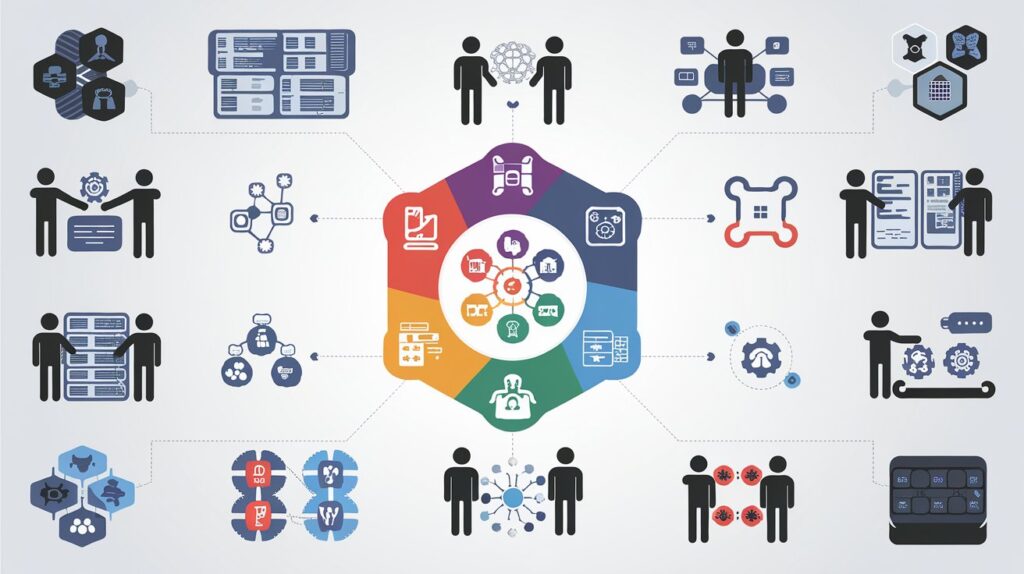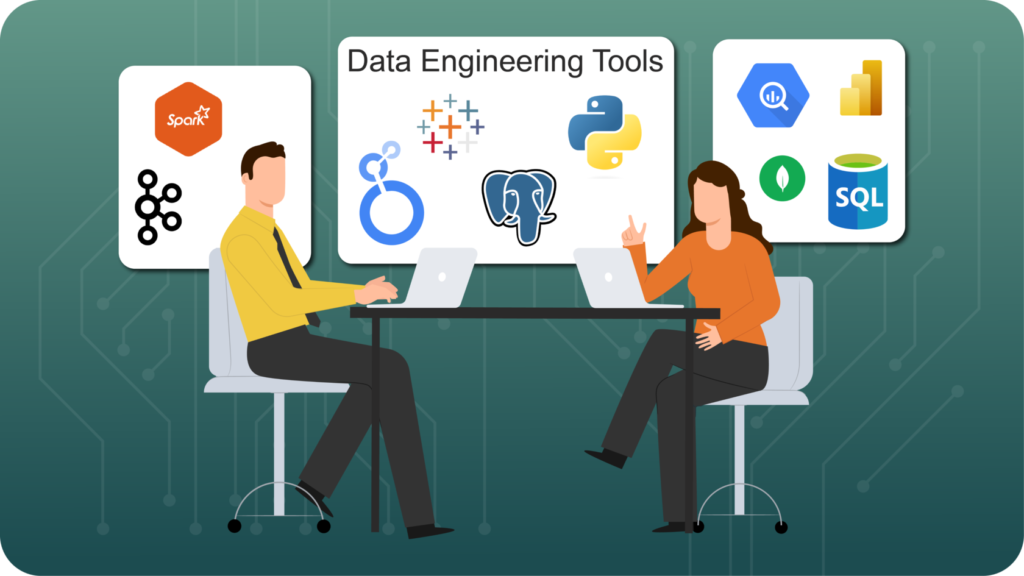

Introduction: The Role of Data Engineering in 2024
Data engineering has become a vital part of the modern data ecosystem. With the exponential growth of big data, businesses rely on data engineering tools to streamline, organize, and process large datasets. As we enter 2024, advancements in technology continue to shape the landscape of data engineering. This blog will explore the Best Data Engineering Tools 2024, covering both popular and emerging tools that are essential for handling complex data pipelines and transforming raw data into actionable insights.
What is Data Engineering?
Data engineering focuses on designing, building, and managing pipelines that collect, store, and analyze data. Whether you’re working with real-time streaming data or batch processing, having the right tools is critical for efficiency. In this section, we’ll discuss the importance of selecting the Top Data Engineering Software to ensure seamless operations.
Key Challenges in Data Engineering
- Handling large datasets efficiently
- Ensuring data accuracy and reliability
- Building scalable data architectures
- Automating workflows and reducing human intervention
By overcoming these challenges, companies can leverage Data Engineering Tools for Big Data to optimize their processes and gain a competitive edge.

Top Data Engineering Tools in 2024
1. Apache Spark: The Powerhouse for Big Data Processing
Apache Spark remains one of the Best Data Engineering Tools 2024 for its high-performance capabilities in large-scale data processing. It offers in-memory computation that drastically speeds up big data tasks like machine learning, streaming, and interactive analysis. Its ability to handle Data Engineering Tools for Big Data is one of the reasons it continues to be a top choice for companies working with vast datasets.
Key Features of Apache Spark:
- Fast data processing with in-memory computation
- Support for multiple programming languages (Scala, Python, Java, etc.)
- Integration with Hadoop and other big data frameworks
2. Apache Kafka: Real-Time Data Streaming
For companies dealing with real-time data, Apache Kafka has become the go-to solution. It enables the processing of continuous streams of data, ensuring real-time insights. As one of the Top Data Engineering Software, Kafka is especially popular in sectors that require constant monitoring, such as finance and e-commerce.
Key Features of Apache Kafka:
- High throughput and low latency
- Scalable architecture to handle millions of messages per second
- Integration with other systems like Spark, Flink, and Hadoop
3. Google BigQuery: Scalable Cloud Data Warehousing
Cloud-native tools are becoming increasingly important in the world of data engineering, and Google BigQuery is one of the Best Data Engineering Tools 2024 for cloud data warehousing. Its serverless architecture and real-time analytics make it ideal for processing large datasets.
Key Features of Google BigQuery:
- Serverless, highly scalable architecture
- Fast SQL queries on massive datasets
- Integration with Google Cloud’s AI and machine learning tools
4. Snowflake: Multi-Cloud Data Platform
Snowflake continues to revolutionize the data engineering space with its multi-cloud architecture. It supports structured and semi-structured data, making it one of the top Data Engineering Tools for Big Data. Snowflake’s unique ability to separate storage and compute resources allows businesses to scale according to their needs, making it one of the Top Data Engineering Software available.
Key Features of Snowflake:
- Seamless multi-cloud support (AWS, Azure, GCP)
- Instant scalability for handling massive datasets
- Advanced data sharing capabilities
5. Apache Airflow: Workflow Automation and Orchestration
For managing complex data pipelines, Apache Airflow stands out as one of the Top Data Engineering Software in 2024. It provides a flexible platform to define, schedule, and monitor workflows, making it ideal for automating data engineering tasks.
Key Features of Apache Airflow:
- Customizable workflows using Python code
- Real-time monitoring of data pipelines
- Integration with major cloud platforms

6. AWS Glue: Serverless ETL for Big Data
AWS Glue simplifies the process of building, managing, and scaling ETL (Extract, Transform, Load) jobs. As one of the Best Data Engineering Tools 2024, Glue offers a fully managed environment that automates time-consuming tasks like schema discovery and job scheduling.
Key Features of AWS Glue:
- Serverless ETL with automatic scaling
- Built-in machine learning capabilities
- Integration with the entire AWS ecosystem
7. Databricks: Unified Analytics Platform
Databricks is a popular choice for both data engineering and data science, offering a collaborative platform that supports both batch and streaming data. As one of the leading Data Engineering Tools for Big Data, it integrates with Apache Spark and provides a unified approach to big data analytics.
Key Features of Databricks:
- Unified platform for data engineering, data science, and machine learning
- Support for streaming and batch data processing
- Scalable cloud-based infrastructure
8. Talend: Comprehensive Data Integration
Talend is another robust tool that excels in data integration. As one of the Top Data Engineering Software options, it offers a suite of tools to connect, cleanse, and transform data across various platforms. Its ease of use and flexibility make it a favorite among data engineers.
Key Features of Talend:
- Support for cloud, on-premises, and hybrid environments
- Real-time data integration and transformation
- Built-in data quality tools

The Future of Data Engineering: Trends to Watch
As you explore the Best Data Engineering Tools 2024, it’s important to stay updated on trends that will influence the future of data engineering. Here are a few emerging trends shaping the data engineering landscape:
1. AI and Machine Learning Integration
The convergence of AI, machine learning, and data engineering is one of the biggest trends for 2024. Tools like Databricks and Google BigQuery are already incorporating machine learning capabilities into their platforms, enabling businesses to build predictive models on top of their data pipelines. The integration of AI into Top Data Engineering Software will allow for smarter automation and more powerful data insights.
2. Serverless Architecture
Serverless computing continues to gain traction in data engineering. Tools like AWS Glue and Google BigQuery use serverless architectures to eliminate the need for managing infrastructure, allowing data engineers to focus solely on developing and optimizing data workflows. This trend will reduce operational overhead and make data engineering more accessible to companies of all sizes.
3. Real-Time Data Processing
The demand for real-time data insights is growing across industries, from finance to e-commerce. Tools like Apache Kafka and Flink are at the forefront of real-time data streaming, enabling businesses to react to changes in their data almost instantaneously. As more businesses adopt real-time analytics, we can expect Data Engineering Tools for Big Data to become more focused on reducing latency and improving real-time processing capabilities.
4. Hybrid and Multi-Cloud Solutions
As businesses increasingly adopt hybrid and multi-cloud strategies, tools that offer flexibility across cloud platforms will see widespread use. Snowflake’s multi-cloud support is an excellent example of how businesses can deploy their data architecture on multiple platforms like AWS, Google Cloud, and Azure, ensuring flexibility and preventing vendor lock-in. Hybrid solutions that combine on-premises and cloud-based data processing will also continue to rise, offering more agility in data management.
5. DataOps and Automation
DataOps, the practice of automating data workflows, is another trend gaining momentum. As data pipelines become more complex, the need for automated solutions that ensure data quality and reliability becomes critical. Tools like Apache Airflow and Prefect are driving this shift by offering workflow orchestration that can automate every step of the data pipeline. Expect to see more businesses adopt Top Data Engineering Software that enhances automation and reduces manual interventions.
Emerging Data Engineering Tools to Watch in 2024
While the tools mentioned above dominate the landscape, several emerging tools are worth watching in 2024. These include:
- Flink: A real-time data processing framework that rivals Spark in speed and performance.
- dbt (data build tool): Specializes in transforming raw data into structured datasets, making it ideal for analytics.
- Prefect: A modern workflow orchestration tool designed for handling complex data pipelines.
Each of these emerging tools holds promise in the evolving world of Data Engineering Tools for Big Data.
Choosing the Right Tool for Your Needs
When selecting the Best Data Engineering Tools 2024, it’s essential to consider your specific requirements. Whether you’re dealing with real-time data streaming, cloud data warehousing, or large-scale batch processing, there’s a tool suited for every challenge. Factors like scalability, cost, ease of integration, and your team’s skillset will play a crucial role in the decision-making process.

Conclusion: Shaping the Future with the Right Tools
As data continues to grow in importance, the demand for efficient and scalable data engineering tools will only increase. The Best Data Engineering Tools 2024 will help businesses process large datasets, automate workflows, and gain actionable insights. Whether you’re a startup looking for cost-effective solutions or an enterprise managing vast amounts of data, leveraging the right Data Engineering Tools for Big Data will give you a competitive edge in 2024 and beyond.
Some of the Best Data Engineering Tools 2024 include Apache Spark, Google BigQuery, Snowflake, Apache Kafka, and AWS Glue. These tools help in handling big data processing, real-time analytics, and workflow automation.
When selecting the Top Data Engineering Software, consider factors like scalability, integration with your existing systems, cost-efficiency, data processing needs, and security features to ensure the tool aligns with your business requirements.
Real-time data engineering tools like Apache Kafka and Apache Flink enable businesses to process and analyze data as it’s generated. This is essential for industries like finance and e-commerce where immediate insights from Data Engineering Tools for Big Data can drive critical decision-making.
Cloud-native tools like Snowflake and Google BigQuery allow businesses to scale their data operations without worrying about infrastructure management. The Best Data Engineering Tools 2024 leverage cloud platforms to offer real-time, scalable, and cost-effective data solutions.
Automation tools like Apache Airflow simplify complex workflows by automating repetitive tasks, ensuring data pipelines run efficiently. Top Data Engineering Software with orchestration features helps reduce errors, saves time, and improves data processing efficiency.

